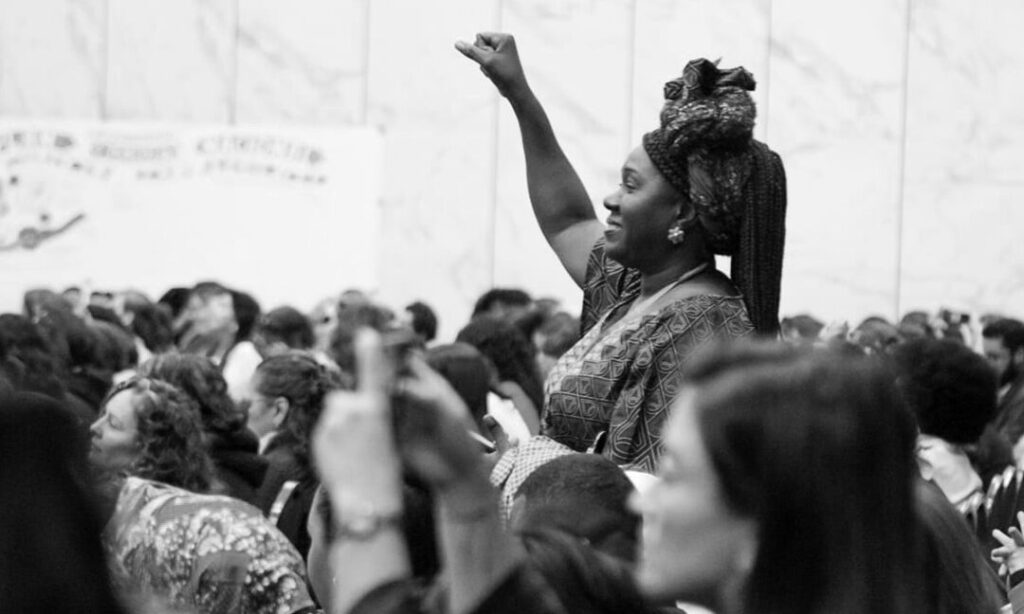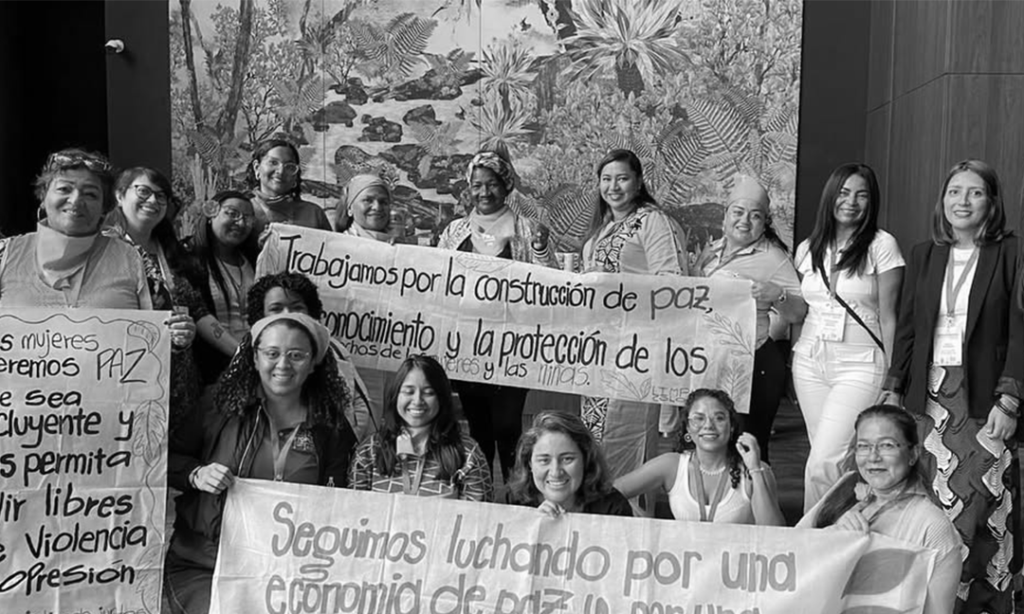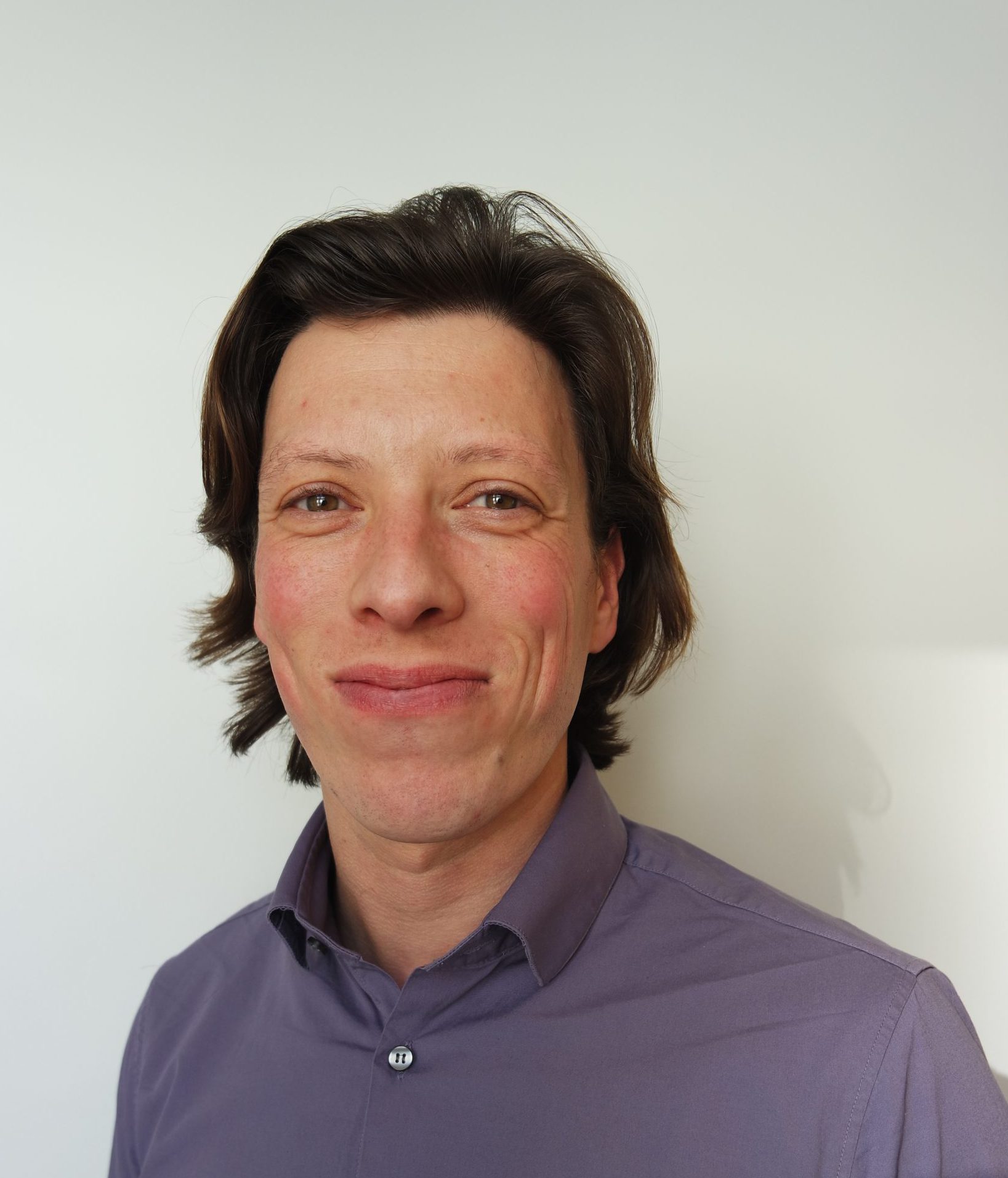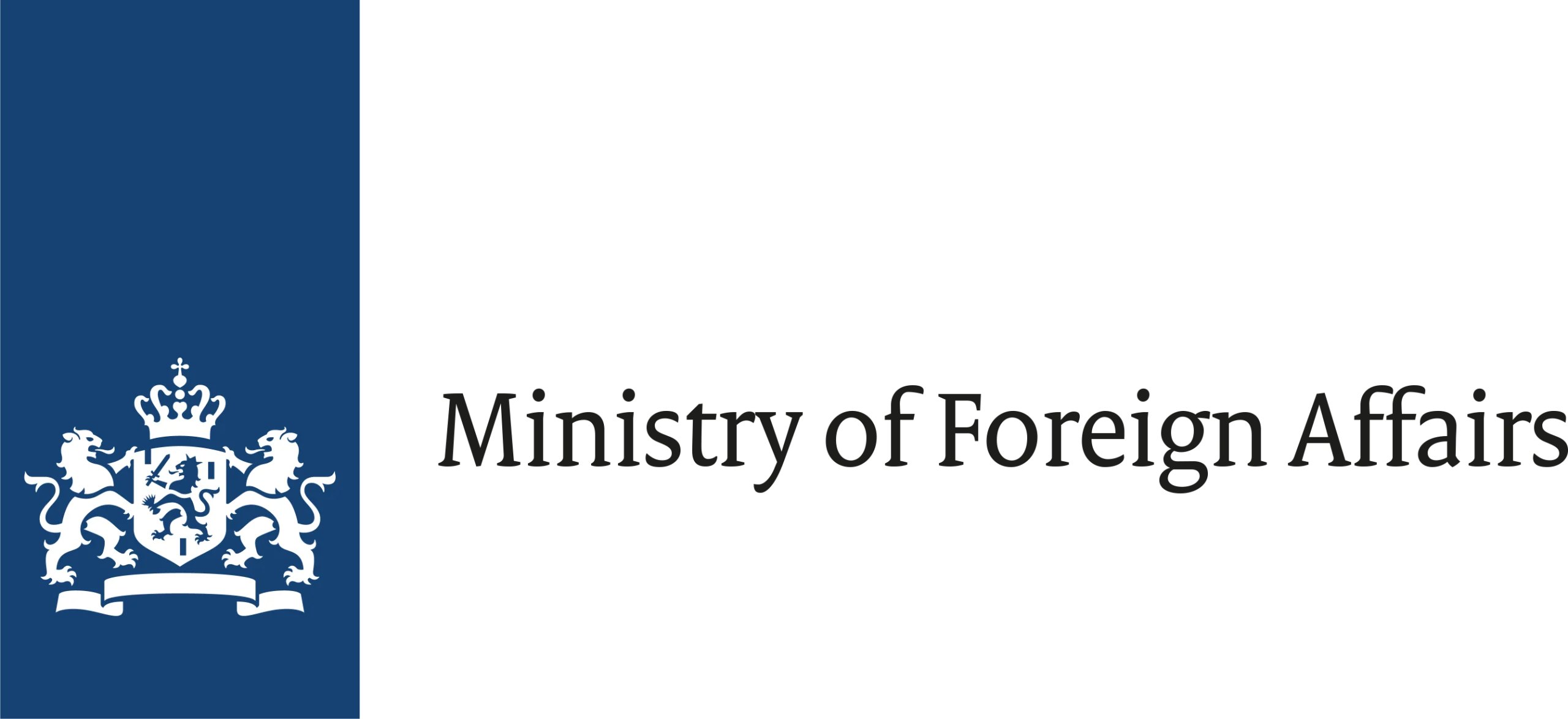Colombia


- NIMD in Colombia: At a glance
- What we do
- How we do it
- Meet the team
Main objective
We work to strengthen the voices of structurally excluded groups—especially women and youth—in Colombia’s peacebuilding process by promoting inclusive democracies, fostering multi-actor dialogue, and advancing advocacy strategies across all territorial levels.
Results
Through dialogue and consultation forums, NIMD and other partners have ensured diverse women’s voices are heard in the consultive period preceding the signing of Colombia’s long awaited National Action Plan (NAP) 1325. This unique and inclusive approach ensures the NAP on Women, Peace and Security reflects the priorities and perspectives of women across different territories, identities and communities, setting Colombia’s NAP process apart. Read more.
In 2023, Colombia held local elections, with new authorities taking office in 2024. NIMD Colombia worked with women-led organizations to strengthen their advocacy skills, enabling them to lobby the newly elected local authorities. Thanks to their efforts, new local development plans include provisions to promote women’s meaningful participation in peacebuilding and decision-making.
In 2020, NIMD and partners established the Observatory on Violence Against Women in Politics, a network of experts and NGOs who provide vital data and analysis. This Observatory has help to change the narrative around political violence in Colombia, creating the foundation for stronger protections. Using the Observatory’s findings, three MPs presented Bills to prevent, address and respond to such violence – an essential step toward breaking the silence and ensuring recourse for those affected. Read more.
NIMD held the first ever national deliberative democracy event in Colombia, bringing together young people from across the country. By engaging in training and dialogue, the participants created a joint declaration urging policymakers to ensure young people can take up their rightful role in politics. With 500 diverse youth voices behind it – and backed by a robust lobbying agenda – the declaration has the power to provide real insight for lawmakers into the needs, demands and challenges of Colombia’s youth. Read more.
Colombia: Political context
For the past decade, Colombia has been rebuilding peace, following more than 50 years of armed conflict, widespread violence and political exclusion.
In 2016, Colombia’s National Government and the militant FARC-EP signed the Final Peace Agreement, bringing peace to this once war-torn country. It was a historic moment for the country and its people.
It is a major achievement for Colombia that peace has endured almost one decade on from the signing of the Peace Agreement. And the country has made notable strides in amplifying previously marginalized voices, with recent elections reflecting increased diversity and representation in politics.
However, the path to lasting peace is long and complex. It requires addressing the injustices of the past and creating robust processes to ensure the right structures are in place for the future. This means not only amplifying the voices of women, Indigenous communities, Afro-Colombians and other historically marginalized groups, but also institutionalizing practices that guarantee these voices remain integral to decision-making.
To ensure progress continues, moving towards a Colombia in which peace, fairness and justice are guaranteed for all people, the country must continue to address deep-rooted inequality, violence and systemic exclusion.
What we do
NIMD has worked in Colombia since 2010 to strengthen democracy and ensure fair political representation of all groups. When the Peace Agreement was signed in 2016, NIMD Colombia was officially designated as a supporter of its implementation, with a key role of ensuring all voices are heard in the journey to implement peace.
We work to tackle systemic inequalities and create opportunities for the perspectives of structurally excluded groups to shape policies.
We do this through different, inter-connected strategies. For example, we support political parties and institutions to become more inclusive, while also providing training to leverage civil society’s power to influence change. And we use technology and innovative methodologies to transform political processes; expand opportunities for participation; and uphold transparency, integrity, inclusion and accountability.
While our work focuses on women and youth, we take an inclusive approach that ensures participation in our activities is diverse and representative. We strive to create spaces where minority groups from different backgrounds and experiences are included and have the opportunity to share their perspectives, ensuring all voices are heard and valued.
We focus much of our work on the Colombian territories most deeply affected by the conflict, which also have some of the lowest rates of political participation of under-represented groups.
Through all of this, we hope to support Colombia in its progress to build a more inclusive and equitable future, laying the foundation for lasting peace where historically silenced voices are heard.
What we do: In numbers
How we do it
Women in Politics
NIMD Colombia strives to break down the barriers to women’s participation in politics and the peace. We know from experience that women bring unique perspectives to addressing the root causes of conflict and fostering long-term stability. Their diversity enhances legitimacy, builds consensus and makes peace more resilient.
We support women politicians by providing mentoring, technical training and networking opportunities. Our participants include political party members, community leaders and electoral candidates. With the right tools and strategies, they have a greater chance of influencing public decision-making and contributing to peace within their country and communities.
Alongside this, we create opportunities for women’s voices to be amplified and heard. We work, for example, with women’s social organizations to ensure they have the means and opportunity to influence politics. And, we hold forums and dialogues to gather diverse viewpoints, ensuring that these feed into and shape the Women, Peace and Security agenda.
We also recognize that true representation requires systemic change. We work with political parties and the Legal Commissions for Women’s Equality to encourage self-assessment and develop strategies for increasing women’s participation. Using NIMD’s Gender Roadmap for Inclusive Political Parties (GRIPP) tool, we help parties better reflect Colombia’s diversity and foster an inclusive internal political culture.
Lastly, we tackle violence against women in politics. In a country where almost 70% of women in politics report facing psychological, sexual, physical political or verbal violence, this remains a major barrier to women’s fundamental right to influence their democracy.
That’s why we set up and support the Observatory on Violence Against Women in Politics to change the narrative around political violence in Colombia, influence political debate and lobby for stronger protections. Alongside this work, we aim to change mindsets by integrating the topic of political violence into our in-person and online learning sessions.
Youth in Politics
Youth in Colombia have historically been excluded from public decision-making due to the constraints of the political system, stigmatization, violence and a lack of opportunities. Through our work, we aim to increase their safe and meaningful participation in politics and peace, ensuring they can fully exercise their political rights.
We do this by bringing together diverse young participants – including members of the LGBTQI+ community, Indigenous peoples and people of African decent – for training and dialogue. Working across geographical and ideological divides, these participants co-create proposals, organize joint advocacy efforts and drive progress towards inclusive political change. Together, with our support, they are making their voices heard for lasting peace.
Additionally, we support the electoral candidacies of outstanding young leaders in regions most affected by Colombia’s conflict. Supporting these leaders not only amplifies the voices of underrepresented communities but also strengthens democracy by fostering a new generation of inclusive and transformative leadership.
Democracy Education
NIMD Colombia has longstanding tradition of running Democracy Schools in some of the country’s most volatile regions, where activists frequently face violence and abuse. By bringing young people together across political divides, we have created a network of Colombian leaders equipped with the strength, knowledge and skills to work towards lasting peace.
Through our most recent editions of the Democracy School, we work alongside Congress officials to strengthen their capacity to respond effectively to citizens’ needs and contribute to a more inclusive democracy. Our curriculum covers key topics such as democratic theory; political reconciliation; and increasing the political participation of structurally excluded groups.
By providing a safe and open space for politicians to train and engage in dialogue, NIMD seeks to foster reconciliation among the country’s previously warring groups. By working across party lines, our Schools inspire collaboration and build bonds of trust that bridge divides, laying the foundation for enduring peace.
Responsive Politics
In addition to our work with Congress through our Democracy Schools, we also provide further support to Colombia’s Parliament to foster a more responsive and inclusive political landscape. A strong Parliament is essential for rebuilding trust, representing citizens’ needs, and ensuring transparency – key elements for lasting peace in a country recovering from decades of conflict.
We also bring together civil society organization to provide training and support to the Congress. Together, they develop joint plans to increase citizen participation and enhance the transparency of Congress. By providing opportunities for Congress to engage constructively with civil society, we hope to contribute to a political culture that prioritizes dialogue and collaboration for the common good.
Lastly, we create open spaces for citizens to engage in dialogue with Congress and Senate. Using innovative technology and methodologies, we provide different avenues to make their voices heard. So far, these public debate spaces have contributed to legislative projects.
Meet the team
Ángela Rodríguez
Country Director, NIMD Colombia
Read more
Ángela Rodríguez is the Country Director of NIMD Colombia.
 Rutger Groothuis
Programme & Knowledge Advisor
Read more
Rutger Groothuis
Programme & Knowledge Advisor
Read more
Rutger Groothuis is the focal point in The Hague working with the Colombia team.
Ángela Rodríguez is the Country Director of NIMD Colombia.

Rutger Groothuis is the focal point in The Hague working with the Colombia team.
Who we work with

NIMD Colombia is funded by the Dutch Ministry of Foreign Affairs under the LEAP4Peace and Power of Dialogue programmes. The LEAP4Peace consortium is made up of NIMD, the Burundi Leadership Training Program, the Gender Equality Network Myanmar, and Gender Action for Peace and Security, and supports women so they can play a meaningful role in political leadership, conflict resolution, and peace building. The Power of Dialogue consortium is made up of NIMD, Gorée Institute, Akina Mama wa Afrika, and Centre des Études Méditerranéennes Internationales, and seeks to enhance collaboration of political and civic actors to participate in accountable political processes.
 Facebook
Facebook LinkedIn
LinkedIn X
X